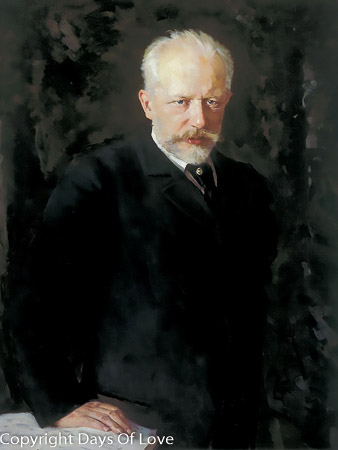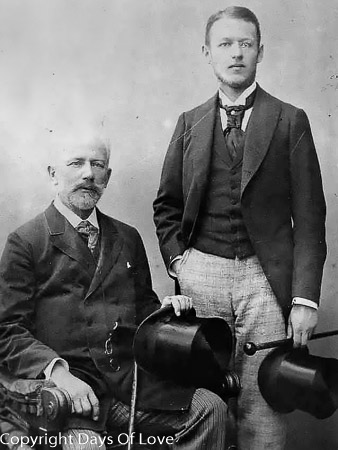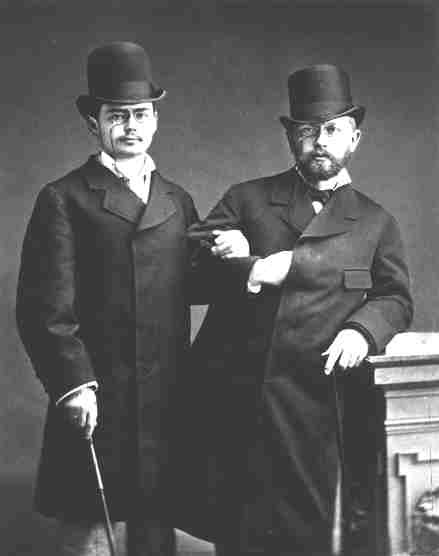

Queer Places:
Saint Petersburg Conservatory, Theatre Square, 3, Sankt-Peterburg, Russia, 190000
Imperial School of Jurisprudence, Fontanka river embankment, 6, Sankt-Peterburg, Russia, 191187
Tchaikovsky House-Museum in Klin, Ulitsa Chaykovskogo, 48, Klin, Moskovskaya oblast', Russia, 141600
Alexander Nevsky Monastery, naberezhnaya reki Monastyrki, 1, St Petersburg, Russia, 191167
 Discussion of Pyotr Ilyich Tchaikovsky (May 7, 1840 – November 6, 1893)'s personal life, especially his sexuality, has
perhaps been the most extensive of any composer in the 19th century and
certainly of any Russian composer of his time.[65]
It has also at times caused considerable confusion, from
Soviet efforts to expunge all references to same-sex attraction and
portray him as a heterosexual, to efforts at armchair analysis by Western
biographers.[66]
Biographers have generally agreed that Tchaikovsky was homosexual.[67]
He sought the company of other men in his circle for extended periods,
"associating openly and establishing professional connections with them."
[58] His first love was reportedly Sergey Kireyev, a younger fellow
student at the Imperial School of Jurisprudence. According to Modest
Tchaikovsky, this was Pyotr Ilyich's "strongest, longest and purest love". The
degree to which the composer might have felt comfortable with his sexual
nature has, however, remained open to debate. It is still unknown whether
Tchaikovsky, according to musicologist and biographer
David Brown, "felt tainted within himself, defiled by something from which
he finally realized he could never escape"[68]
or whether, according to Alexander Poznansky, he experienced "no unbearable
guilt" over his sexual nature[58]
and "eventually came to see his sexual peculiarities as an insurmountable and
even natural part of his personality ... without experiencing any serious
psychological damage."[69]
Relevant portions of his brother Modest's autobiography, where he tells of the
composer's sexual orientation, have been published, as have letters previously
suppressed by Soviet censors in which Tchaikovsky openly writes of it.[70]
Such censorship has persisted in the current Russian government, resulting in
many officials, including the current culture minister
Vladimir Medinsky, to outright deny his homosexuality.[71]
Discussion of Pyotr Ilyich Tchaikovsky (May 7, 1840 – November 6, 1893)'s personal life, especially his sexuality, has
perhaps been the most extensive of any composer in the 19th century and
certainly of any Russian composer of his time.[65]
It has also at times caused considerable confusion, from
Soviet efforts to expunge all references to same-sex attraction and
portray him as a heterosexual, to efforts at armchair analysis by Western
biographers.[66]
Biographers have generally agreed that Tchaikovsky was homosexual.[67]
He sought the company of other men in his circle for extended periods,
"associating openly and establishing professional connections with them."
[58] His first love was reportedly Sergey Kireyev, a younger fellow
student at the Imperial School of Jurisprudence. According to Modest
Tchaikovsky, this was Pyotr Ilyich's "strongest, longest and purest love". The
degree to which the composer might have felt comfortable with his sexual
nature has, however, remained open to debate. It is still unknown whether
Tchaikovsky, according to musicologist and biographer
David Brown, "felt tainted within himself, defiled by something from which
he finally realized he could never escape"[68]
or whether, according to Alexander Poznansky, he experienced "no unbearable
guilt" over his sexual nature[58]
and "eventually came to see his sexual peculiarities as an insurmountable and
even natural part of his personality ... without experiencing any serious
psychological damage."[69]
Relevant portions of his brother Modest's autobiography, where he tells of the
composer's sexual orientation, have been published, as have letters previously
suppressed by Soviet censors in which Tchaikovsky openly writes of it.[70]
Such censorship has persisted in the current Russian government, resulting in
many officials, including the current culture minister
Vladimir Medinsky, to outright deny his homosexuality.[71]
Tchaikovsky lived as a bachelor for most of his life. In 1868 he met Belgian soprano Désirée Artôt. They became infatuated with each other and were engaged to be married[72] but due to Artôt's refusal to give up the stage or settle in Russia, the relationship ended.[73] Tchaikovsky later claimed she was the only woman he ever loved.[74]

with Davydov

with Kotek
By the time he was 32, Tchaikovsky went for a trip abroad alone with a favourite 19 years old pupil, Vladimir Shilovsky. He was happy on this tour to Nice, Genoa, Venice and Vienna, as we can tell from the gay piano pieces he wrote on it, dedicated to Vladimir. This was the first significant love of his life. When the boy was ill in Paris, Tchaikovsky abandoned his own work to rush to Paris to be with him. When Vladimir was with him in the country, at the villa Madame von Meck placed at his disposal, we find him euphorically composing Swan Lake; or hally in a burst of creativeness writing The Tempest music in ten days. Vladimir was, however a consumptive and died young; his place in the composer's affections was taken by his nephew, Bob Davydov.
On 28 September 1876, Pyotr Ilyich Tchaikovsky wrote to his brother Modest about his ‘vices’ and their sister Alexandra: I know that she guesses everything and forgives everything. Thus am I treated by very many people whom I love or respect. Do you really think that I am not oppressed by this awareness that they pity and forgive me, when in fact I am guilty of nothing! [. . .] In a word, I should like by my marriage or, in general, an open affair with a woman to shut the mouths of various contemptible creatures whose opinion I do not value in the least but who can cause pain to people close to me.
In 1877, at the age of 37, he wed a former student, Antonina Miliukova.[75] The marriage was a disaster. Mismatched psychologically and sexually,[76] the couple lived together for only two and a half months before Tchaikovsky left, overwrought emotionally and suffering from an acute writer's block.[77] Tchaikovsky's family remained supportive of him during this crisis and throughout his life.[78] His friend Nikolai Bochechkarov helped him to find relief with servants and male prostitutes. He was also aided by Nadezhda von Meck, the widow of a railway magnate who had begun contact with him not long before the marriage. As well as an important friend and emotional support,[79] she became his patroness for the next 13 years, which allowed him to focus exclusively on composition.[80] Tchaikovsky's marital debacle may have forced him to face the full truth about his sexuality; he never blamed Antonina for the failure of their marriage.[81]
Tchaikovsky went to Davos to see his former student and lover, Iosef Kotek, in November 1884. Soso Kotik (‘Joe the Tomcat’) was Tchaikovsky’s nickname for him. They had met when Tchaikovsky was teaching composition at the Moscow Conservatory. Kotik, a violinist, was the source of inspiration for Violin Concerto in D, composed at Nadezhda von Meck’s estate at Clarens in Switzerland. Kotek died in Davos in January 1885, aged twenty-nine.
Vladimir Davydov (December 14 [O.S. December 2] 1871 – December 27 [O.S. December 14] 1906) was the second son of Lev and Alexandra Davydov, and nephew of Tchaikovsky, who called him "Bob". Although Tchaikovsky was infatuated with him, and although both were homosexual, there is no evidence that their relationship ever became sexual in nature. Tchaikovsky was attended through life by a faithful valet, who was more of a "pal" than a servant: one would have thought that that helped. Aleksey Sofronov was 14 when he came into service. In his candid letters to his brother Modest, who shared Peter's tastes, he confides that there is not a second in the day when he does not think to Aleksei, and at night he dreams about him. In his will Tchaikovsky took good care of Aleksei, leaving him a share in his estate, another in his royalties, with all the household furniture and effects.
My published books: